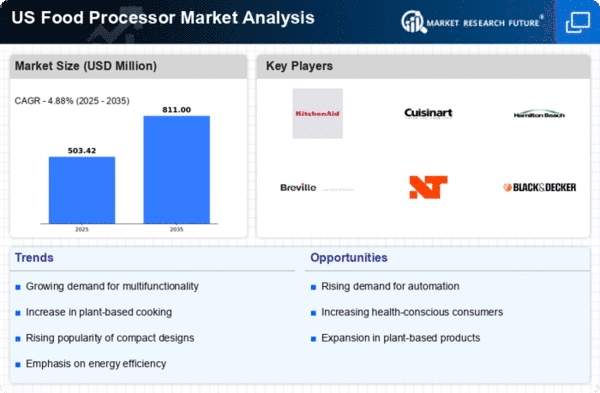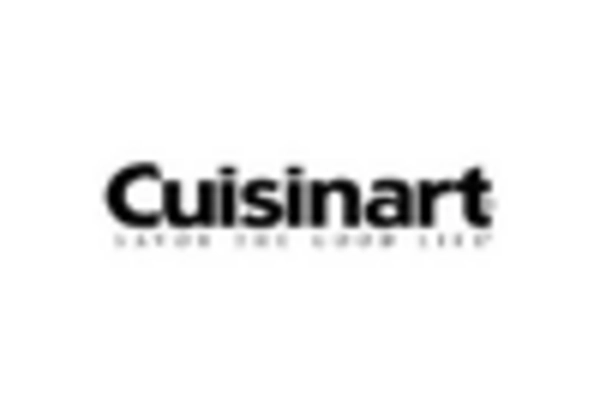Health and Wellness Trends
The food processor market is significantly influenced by the rising health and wellness trends among consumers. As individuals become more health-conscious, there is an increasing preference for homemade meals over processed foods. Food processors enable users to prepare fresh ingredients, control portion sizes, and create nutritious meals with ease. This shift towards healthier eating habits is reflected in market statistics, which show a 20% increase in sales of food processors that emphasize health-oriented features, such as low-fat cooking and nutrient preservation. The ability to create smoothies, purees, and healthy snacks at home aligns with the growing demand for clean eating. As health trends continue to evolve, the food processor market is expected to adapt, offering innovative solutions that cater to the needs of health-focused consumers.
Increased Demand for Convenience
The food processor market is experiencing a notable surge in demand for convenience-driven kitchen appliances. As consumers lead increasingly busy lifestyles, the need for time-saving cooking solutions becomes paramount. Food processors offer multifunctionality, allowing users to chop, slice, and puree ingredients quickly. This trend is reflected in market data, which indicates that the sales of food processors have risen by approximately 15% over the past year. The convenience factor is particularly appealing to working professionals and families, who seek efficient meal preparation methods. As a result, manufacturers are innovating to enhance the user experience, integrating features that cater to the fast-paced demands of modern life. This driver is likely to continue shaping the food processor market, as convenience remains a top priority for consumers.
Growing Interest in Culinary Skills
There is a burgeoning interest in culinary skills among consumers, which is positively impacting the food processor market. As more individuals take to cooking at home, the demand for tools that facilitate this hobby is increasing. Food processors are viewed as essential kitchen companions that simplify complex cooking tasks, making them attractive to both novice and experienced cooks. Market data suggests that the segment of food processors designed for home chefs has seen a growth rate of around 10% annually. This trend indicates a shift towards more sophisticated cooking techniques, with consumers eager to experiment with new recipes and cuisines. Consequently, the food processor market is likely to benefit from this growing enthusiasm for culinary exploration, as more people invest in high-quality kitchen appliances.
Rising Popularity of Meal Prep Culture
The food processor market is benefiting from the growing trend of meal prep among consumers. As more individuals adopt meal prepping as a strategy to save time and maintain healthy eating habits, the demand for efficient kitchen appliances increases. Food processors are essential tools in this process, enabling users to prepare large quantities of ingredients quickly and uniformly. This trend is supported by market data showing that food processors designed for meal prep have seen a growth rate of approximately 18% over the last year. The convenience of batch cooking and portion control aligns with the lifestyle choices of busy individuals and families. Consequently, the food processor market is likely to continue thriving as meal prep culture becomes more entrenched in everyday life.
Technological Advancements in Kitchen Appliances
Technological advancements are playing a crucial role in shaping the food processor market. Innovations such as smart technology integration, enhanced motor efficiency, and improved blade designs are making food processors more appealing to consumers. These advancements not only enhance performance but also improve user safety and convenience. For instance, some models now feature touch controls and programmable settings, allowing for greater customization in food preparation. Market analysis indicates that the introduction of smart food processors has led to a 25% increase in sales within this segment. As technology continues to evolve, the food processor market is likely to see further growth, driven by consumer demand for high-tech kitchen solutions that simplify cooking processes.

















